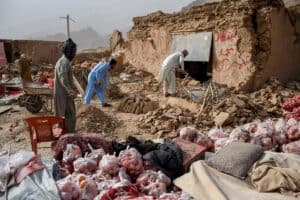The department of international relations and cooperation says they have established contact, via the SA high commission in Islamabad, Pakistan.

It was still uncertain yesterday (Friday) when South Africans in Afghanistan would return home following the takeover by the Taliban.
Clayson Monyela, spokesperson for the department of international relations and cooperation, said they had established contact via the SA high commission in Islamabad, Pakistan, with several South Africans to ensure
their safety to provide the necessary consular assistance.
Anil Sooklal, deputy director-general responsible for Asia and the Middle East for Dirco, said they had been liaising with the high commission in Islamabad, which is accredited to Afghanistan.
“This morning we were told 16 South African nationals working at the National Airways Corporation in Afghanistan have been airlifted out of Kabul by the National Security Committee and rode to Islamabad,” Sooklal said.
He said he was also notified about another four SA nationals working at Karanprayag.
“We are in touch with seven other South Africans who have registered after the call from the embassy.”
Sooklal said the seven said they were fine and were not in any danger and wanted to continue working there.
Politico-economic analyst Daniel Silke said Afghanistan was a very complicated issue.
“Afghanistan now enters a very uncertain future in which the Taliban can either choose to resort to their activities before they were removed from power. – in other words be a sanctuary for terror against the West – or they can carve out a new role for themselves, which can gain them some international legitimacy if they do,” said Silke.
He added that the Afghan economy was barely functional.
“It has been propped up by investments from the United States, and the position now is that just about every aspect
of the economy is going to be affected negatively by the political uncertainty that exists within the country.”
Silke said there was now an opportunity for the Chinese to heavily invest in Afghanistan.
“If the Chinese wish to get some leverage in Afghanistan [after] the Americans pull out, they can secure diplomatic leverage.”
He said what happens in Afghanistan has huge global implications.
“It’s not just what happens in the desert and mountains.
ALSO READ: Little information about South Africans stranded in Afghanistan
“The entire immediate future of Afghanistan is completely uncertain and the rebuilding of that country is going to refine under Taliban rules,” said Silke.
Dr Ahmed Al-Mandhari, World Health Organisation (WHO) regional director for the Eastern Mediterranean, said 13,897 conflict-related trauma cases were received at 70 WHO-supported health facilities in Afghanistan, in July, compared with 4,057 cases in July last year.
“Hospitals have reported 20,988 trauma cases in the past two months,” he said. Al-Mandhari said earlier this week two of its mobile health teams had been on hold for 36 hours due to insecurity.
“Furthermore, attacks on health care remain a major challenge. From January to July, 26 health facilities and 31 healthcare workers were affected and 12 health workers were killed,” Al-Mandhari said.
Doctors Without Borders’ (MSF) southern Africa spokesperson Angela Makamure said they had advised their Afghanistan staff to go home earlier this week.
“We are temporarily reducing the number of international staff in our coordination office in Kabul, although we don’t have projects in Kabul currently.”
She added that in Kunduz, MSF treated 63 patients between 9 and 14 August and in Lashkar Gah 65 wounded patients were treated between 12 and 16 August.
Support Local Journalism
Add The Citizen as a Preferred Source on Google and follow us on Google News to see more of our trusted reporting in Google News and Top Stories.






